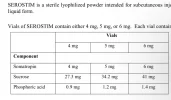Yep, it's all down to sterilization using radiation after they're in their final container, preventing bacteria "eating" the protein, and a careful choice of excipients that control degradation by preventing oxidation, formation of aggregates, and most importantly, controlling PH. A small difference from the correct PH can speed up degradation of peptides by 10x.
Using the correct reconstitution ratio is
another big factor. Too concentrated, something many people do unwittingly thinking it doesn't matter speeds up the formation of contaminants that both weaken the potency of the peptide, and cause other problems by triggering the immune system.
Done correctly, for instance, pharma Semaglutide and Tirz, reconstituted in pens, lasts for 2 years inside the fridge without significant degradation, and a month at room temp.
Here's the formula for Serostim:
View attachment 305397
vs Norditropin, which comes reconstituted requiring more protection:
View attachment 305401
Here are the consequences of contamination, primarily degradation after manufacture, of various pharma HGH formulations. The antibodies result in an increasing loss of effectiveness of the GH over time, because your immune system develops the ability to clear it from your system.
View attachment 305398
Filtration, especially immediately prior to injection can reduce antibody inducing contaminants significantly, lessening side effects and the potential of the peptide losing efficacy over time.







